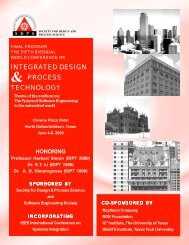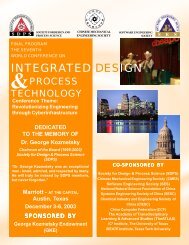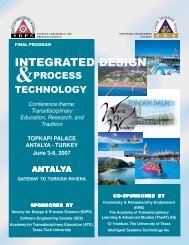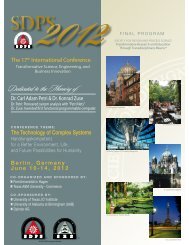IDPT(SDPS) 2008 Asia University
IDPT(SDPS) 2008 Asia University
IDPT(SDPS) 2008 Asia University
- No tags were found...
Create successful ePaper yourself
Turn your PDF publications into a flip-book with our unique Google optimized e-Paper software.
WORKSHOP-III OnTransdisciplinary Fundamentals: Impact on engineering CurriculaThursday June 5, <strong>2008</strong> 1:30 pm - 3:30 pm Room: A101Workshop Organizers : Dr. C.V. Ramamoorthy, <strong>University</strong> ofCalifornia, Berkeley, CA, Dr. M. Tanik, <strong>University</strong> of Alabama atBirmingham, AL, USA; Dr. A. Ertas, Texas Tech <strong>University</strong>,Lubbock, TX, USA., Dr. Fuad Gattaz Sobrinho, Director ofInternational Institute on Systems Integration - IIISis, Campinas,Sao Paulo, BrazilWorkshop Chairperson: Dr. Vicki Rainey, DyersburgCommunity College,TN.Description:Two decades ago we realized the necessity of extensive introductionof the design courses into engineering curricula. Successeswe achieved with the introduction of design into the curricula areundisputable. At the same time, we realize that we need to do morealong the lines of introduction of design; for example introductionof processes and systems. Transdisciplinary entanglements ofengineering artifact design and development requires a fresh lookto identify transdisciplinary fundamentals for curriculum enhancementpurposes. This workshop should be about identifying thesefundamentals.In the 21st century, due to our advances in classical engineering, ithas become possible to apply unprecedented analysis techniquesto natural processes. These include our ability to investigate verysmall processes such as atomic processes and very large-scaleprocesses such as weather patterns and cosmic objects. Theseadvances also opened up the application of quantitative and engineeringtechniques to all facets of human life. In the 21st century, itis time to capitalize on this collective experience in science andengineering. Transdisciplinary approaches, provided by computa-tional means, which we call “meta-fusion,” have the potential tolocate and integrate these disparate knowledge pieces into a cohesivewhole. This is the new process of knowledge generation.On the dissemination side, we also need a new approach. Currenteducational systems, due to their massive administrative structureand reductionism are not fully responsive to the needs of 21stcentury. For example, Dr. Robert Ronstadt in his novel book “TheTuition Travesty” addresses an aspect called the “financial string”for a college education. During 1995 when we were developing<strong>SDPS</strong> emblem we had come up with the notion of three “E”s: Ethics-Weshould be human, Economics-We should survive, and Environment-Weshould let others survive. We had debated whetherwe should have the fourth E-Education in the emblem. We decidedthat the fourth E-Education is really at the center of these abovethree “E,” without it we could not achieve any of these “three E” s.This means formal and informal dissemination of knowledge justlike computation is an integral part of the Transdisciplinary activity.We owe to the next generations a set of fundamental notions inwhich there will be a balance between holism and reductionism sothat they will enjoy an intellectual control in designing and developingadvanced integrated engineering artifacts. Future engineers orsystems integrators, in this framework of meta-fusion, will developfunctional artifacts and services by taking into consideration economical,environmental, and ethical aspects of human awareness.One of the key benefits of this workshop will be to discussdeveloping a generic transdisciplinary fundamentals coursewhich can be used in the transdisciplinary programs such asHealth care Engineering, Business Engineering, IntegratedSystems Engineering.WORKSHOP-IV OnKnowledge Transfer Through Social NetworksThursday June 5, <strong>2008</strong> 4:00 pm - 6:00 pm Room: A101Organizers and Chairs:Dr. Jörn Altmann, Seoul National <strong>University</strong> and Intl.<strong>University</strong> of Bruchsal, GermanyDr. Aurelie Bechina, <strong>University</strong> Collegei Buskerud, NorwayDr. Bernd Kraemer, FernUniversitaet in Hagen, GermanyDr. J. Altmann Dr. A. Bechina Dr. B. KraemerParticipant: Inge HermanrudHedmark <strong>University</strong> College, NorwayNetworks, ICT, and Coordination in Distributed OrganisationsThe continuously growing role of the Internet and its exorbitantnumber of information resources leads to a new notion ofinformation that is trusted though unknown. We observe anincreasing use of unverified intransparent information andknowledge from unknown sources. Web 2.0, also called theparticipative Web, seems to accelerate this development. Webelieve, however, that social networking and social softwareenabling rich forms of symbolic interaction in networkedcommunities of practice oppose to this trend because:- the community defines boundaries within which knowledge isproduced and shared primarily;- the members of a community share common interests, whichmake it more likely that information fitting a persons needs isowned by a peer in the community rather than by anyone elsebeyond the community’s boundary;- a certain degree of trust is an inherent element of a community;- social software provides commodity tools to knowledgemanagement that are more usable than traditional knowledgemanagement approaches.This workshop will address these issues from differentperspectives: Aurélie Bechina will approach the theme from herlong-term expertise in knowledge management. Jörn Altmann, whohas pioneered social networking software and is an expert in socialnetwork analysis, will represent both a technical and theoreticaldimension, and Bernd Krämer will approach the theme from anapplication point of view, especially reuse and sharing of learningcontent and codified learning and teaching expertise. Two or threeshort presentations will set the scene and raise a few hypothesesthat will be subject to a hopefully lively debate in the audience.








